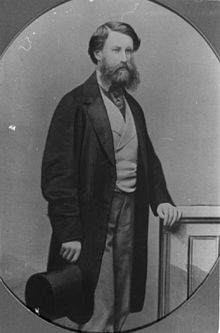George Vesey Stewart

George Vesey Stewart (1832–1920) was a notable New Zealand farmer, coloniser and local politician. He was born in Brighton, Sussex, England in about 1832.[1]
The 1881 election in the newly formed Tauranga electorate was hotly contested. Four candidates were nominated: George Morris, who had previously represented the East Coast electorate; Stewart, then the owner of the Bay of Plenty Times; William Kelly, who had also previously represented the East Coast electorate; and Henry Thomas Rowe, a surveyor and commission agent.[2] Rowe announced his retirement from the contest on 6 December three days out from election day, urging his supporters to vote for Stewart instead.[3] The unofficial results were released the day after the election (on Saturday, 10 December) and Morris had a majority of 13 votes over Stewart, with the official declaration to be made on 12 December.[4] This was deferred until 14 December, with Morris ahead by 10 votes.[5] Stewart stood for the Tauranga mayoralty a few months later and was elected the town's first mayor.[1]
Stewart stood in the 1893 election in the Bay of Plenty electorate as an independent and came a distant fourth.[6]
His brother's wife was Adela Blanche Stewart, who wrote the book My Simple Life in New Zealand.
References[]
- ^ a b Rorke, Jinty. "George Vesey Stewart". Dictionary of New Zealand Biography. Ministry for Culture and Heritage. Retrieved 1 December 2011.
- ^ "Nomination of Candidates for the Tauranga Electorate". Bay of Plenty Times. Vol. X, no. 1152. 30 November 1881. p. 2. Retrieved 28 November 2013.
- ^ "The Bay of Plenty Times". Bay of Plenty Times. Vol. X, no. 1158. 7 December 1881. p. 2. Retrieved 30 November 2013.
- ^ "The Bay of Plenty Times". Bay of Plenty Times. Vol. X, no. 1161. 10 December 1881. p. 2. Retrieved 30 November 2013.
- ^ "Declaration of the Poll for the Tauranga Electorate". Bay of Plenty Times. Vol. X, no. 1164. 14 December 1881. p. 2. Retrieved 30 November 2013.
- ^ The General Election, 1893. Government Printer. 1894. p. 1. Retrieved 19 November 2013.
- 1832 births
- 1920 deaths
- New Zealand farmers
- English emigrants to New Zealand
- Mayors of Tauranga
- Unsuccessful candidates in the 1881 New Zealand general election
- Unsuccessful candidates in the 1893 New Zealand general election
- People from Brighton
- New Zealand politician stubs